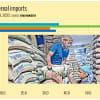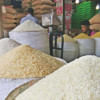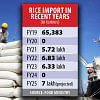No sign of stability in rice market

Rice import by the private sector has dropped to a four-year low at a time when its prices have shot up in the domestic market.
Traders imported only 1.2 lakh tonnes of rice till mid-June in the current fiscal year against 2.56 lakh tonnes in the previous fiscal year.
Its import has not dipped so low since 2012 when 29,000 tonnes of rice were imported.
Importers blame the existing 28 percent tariff on rice import for the decline.
As the domestic rice market has become volatile, the government is trying to replenish its depleting stock through quick import. But it hasn't yet made any move to encourage rice import by the private sector.
Last week, the government decided to import parboiled rice from Vietnam for more than Tk 39 a kg.
The state-run Trading Corporation of Bangladesh recorded 47 percent hike in the prices of coarse rice this month compared to that in the corresponding month last year.
TARIFF DISCOURAGING IMPORT
Government statistics show letters of credit were opened for import of 2.25 lakh tonnes of rice in the current fiscal year but the private sector imported only half the quantity till mid-June.
Market sources told The Daily Star that though import of more rice is in the pipeline, the importers are making delay in bringing shipments with the hope that the government would soon go for a tariff cut.
With rice prices going up in the global market, local traders are increasingly finding it difficult to make a profit after paying high tariff on import.
Market sources said rice import is no longer lucrative for traders as they have to pay 28 percent tariff on top of high import costs.
They are not showing interest in importing rice though its prices have shot up in the local market (coarse rice Tk 48 a kg). They are still waiting for the government to withdraw the import duty.
PRICES UP IN INT'L MARKET
A food ministry document shows that price of parboiled rice rose to $410 a tonne this month from $384 a tonne in June last year and $397 in the previous month.
In May-June this year, parboiled rice prices rose by 3.3 percent in India, 5.6 percent in Thailand and 2.4 percent in Pakistan, while the price of Vietnamese white rice (atap) went up by 8.2 percent, show yesterday's data by the Food Planning and Monitoring Unit (FPMU) of the food ministry.
Last month, Bangladesh struck two deals to import 50,000 tonnes of parboiled rice for $427.85 a tonne and another 50,000 tonnes of white rice for $406.48 a tonne.
Only two weeks later, it signed a deal with Vietnam for importing 2.5 lakh tonnes of rice (50,000 tonnes of parboiled and two lakh tonnes of white rice) at a higher price. It agreed to pay $470 a tonne for parboiled rice and $430 a tonne for white rice.
Food ministry sources said that apart from Bangladesh, at least six other countries sought to import rice from Vietnam in recent weeks, resulting in a hike in demand and the price.
The six countries are the Philippines, Sri Lanka, Malaysia, Indonesia, Cuba and China.
RATIONALE BEHIND TARIFF
The government didn't have to import rice since fiscal 2011-12 due to successive good yields of rice in harvest seasons.
But taking advantage of the zero-tariff import facility, private importers brought in 3.75 lakh tonnes of rice in fiscal 2013-14 and nearly 15 lakh tonnes in the following fiscal year, flooding the domestic market with cheap Indian rice.
To protect local rice growers, the government imposed a high tariff of 28 percent on rice import in two phases in 2015.
Talking to The Daily Star, agricultural economist Dr Jahangir Alam said import tariff should not be static. The government should adjust it according to the given situation.
Omer Azam, general secretary of Chittagong Rice Traders Association, said rice production is likely to fall short of the target and the domestic market now requires an increased supply through import for price stabilisation.
But importers are waiting for a government decision on tariff cut, he added.
Though the food ministry has proposed a tariff cut on rice import, the finance ministry is yet to decide on it.
WHY RICE PRICES SOARED?
In addition to open market sale, vulnerable group feeding and other social safety net programmes, the government late last year introduced Tk 10-a-kg rice programme for five million ultra poor.
Over the last one year, many such government programmes have led to the depletion of food reserve with rice stock falling to a six-year low of 1.9 lakh tonnes.
On the other hand, the food department's initiative to replenish rice stock by procuring Boro fizzled out. Millers refused to sell rice to the department for Tk 34 a kg set by the government.
In the first 11 months of this fiscal year, 14.83 lakh tonnes of rice were distributed under various government programmes against 11.75 lakh tonnes in the corresponding period of fiscal 2015-16. Under the fair price programme alone, 6.84 lakh tonnes of rice were distributed.
An unusual early flashflood that struck the haor region in late March caused a loss of Boro rice totalling one million tonnes.
According to market sources, blast attacks (fungi attack) also led to a loss of Boro rice in 19 districts. But the agriculture department claimed that the loss was nominal.
Experts and agricultural economists say the government's temporal inability to go for market intervention due to its current low stock allowed rice millers and traders to hike the prices.
Rice prices would be stable if supply of the staple is increased in the domestic market quickly through imports by both the government and private channels, they noted.


 For all latest news, follow The Daily Star's Google News channel.
For all latest news, follow The Daily Star's Google News channel. 







Comments